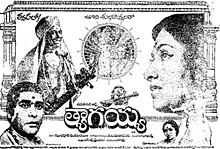
Thyagaraja, also known as Thyāgayya and in full as Kakarla Thyagabrahmam, was a composer and vocalist of Carnatic music, a form of Indian classical music. Tyagaraja and his contemporaries, Shyama Shastri and Muthuswami Dikshitar, are regarded as the Trinity of Carnatic music. Tyagaraja composed thousands of devotional compositions, most in Telugu and in praise of Rama, many of which remain popular today, the most popular being "Nagumomu". Of special mention are five of his compositions called the Pancharatna Kritis, which are often sung in programs in his honour, and Utsava Sampradaya Krithis, which are often sung to accompany temple rituals.

Nandamuri Taraka Rama Rao, often referred to by his initials NTR, was an Indian actor, filmmaker and politician who served as Chief Minister of Andhra Pradesh for seven years over three terms. He starred in over 300 films, predominantly in Telugu cinema, and was referred by the media as Viswa Vikhyatha Nata Sarvabhouma. Rao received three National Film Awards for co-producing Thodu Dongalu (1954) and Seetharama Kalyanam (1960) under National Art Theater, Madras, and for directing Varakatnam (1970). Known for his breakthrough performances in Raju Peda (1954) and Lava Kusa (1963), Rao garnered the Nandi Award for Best Actor for Kodalu Diddina Kapuram in 1970, and the Inaugural Filmfare Award for Best Actor – Telugu in 1972 for Badi Panthulu.

Swathi Muthyam is a 1986 Indian Telugu-language romantic drama film written and directed by K. Viswanath and produced by Edida Nageswara Rao. The film stars Kamal Haasan and Radhika, while Gollapudi Maruti Rao, J. V. Somayajulu, Nirmalamma, Sarath Babu, and Y. Vijaya play supporting roles. The soundtrack and background score were composed by Ilaiyaraaja. Swathi Muthyam depicts the plight of a young widow who is rescued by an autistic man.

The Pancharatna kritis are a set of five kritis (songs) in Carnatic classical music, composed by the 18th-century Indian composer Tyagaraja. All the kritis, as is the case with almost all of Tyagaraja's compositions, are penned in Telugu, except the first one, which is composed in Sanskrit. The songs are: "Jagadananda karaka", "Dudukugala Nanne", "Sadhinchene", "Kanakana Ruchira" and "Endaro Mahanubhavulu".

Muthuswami Dikshitar (Mudduswamy Dikshitar)(IAST: muttusvāmi dīkṣitar, 24 March 1776 – 21 October 1835), mononymously Dikshitar, was a South Indian poet, singer and veena player, and a legendary composer of Indian classical music, who is considered one of the musical trinity of Carnatic music. Muthuswami Dikshitar was born on 24 March 1775 in Tiruvarur near Thanjavur, in what is now the state of Tamil Nadu in India, to a family that is traditionally traced back to Virinichipuram in the northern boundaries of the state. His compositions, of which around 500 are commonly known, are noted for their elaborate and poetic descriptions of Hindu gods and temples and for capturing the essence of the raga forms through the vainika (veena) style that emphasises gamakas. They are typically in a slower speed (chowka kala). He is also known by his signature name of Guruguha which is also his mudra (and can be found in each of his songs). His compositions are widely sung and played in classical concerts of Carnatic music.
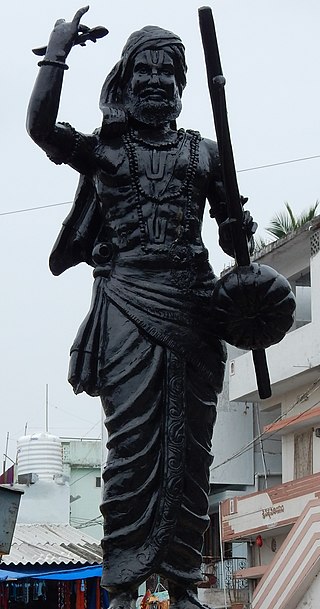
Kancharla Gopanna, popularly known as Bhakta Ramadasu or Bhadrachala Ramadasu, was a 17th-century devotee of the Hindu god Rama, a saint-poet and a composer of Carnatic music. He is a famous Vaggeyakara from the Telugu classical era. He was born in the village of Nelakondapalli in Khammam district, and orphaned as a teenager. He spent his later years in Bhadrachalam and 12 years in solitary confinement at the Golconda prison during the Qutb Shahi-rule. Different mythical stories about his life circulate in the Telugu tradition. He is renowned for constructing the famous Sita Ramachandraswamy Temple and pilgrimage center on the banks of river Godavari at Bhadrachalam. His devotional kirtana lyrics to Rama illustrate the classical Pallavi, Anupallavi and Caranam genre composed mostly in Telugu, some in Sanskrit and with occasional use of Tamil language. These are famous in South Indian classical music as Ramadaasu Keertanalu.
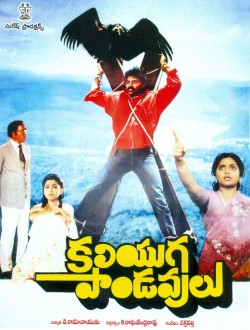
Kaliyuga Pandavulu is a 1986 Indian Telugu-language masala film produced by D. Ramanaidu under Suresh Productions, and directed by K. Raghavendra Rao. It stars Ramanaidu's son Venkatesh and Khushbu, with music composed by Chakravarthy. The film was a box office hit, and was remade in Kannada in 1989 as Poli Huduga. Venkatesh won the Nandi Special Jury Award for his Debut acting.

Jonnalagadda Venkata Somayajulu was an Indian actor known for his works in Telugu cinema and a few Tamil, Malayalam, Kannada and Hindi films. In 1981, he received the Filmfare Award for Best Actor – Telugu for his work in the classic Sankarabharanam. On the centenary of Indian cinema, Forbes included his performance in the film among the 25 Greatest Acting Performances of Indian Cinema.

Kadiri Venkata Reddy was an Indian film director, screenwriter, and producer who primarily worked in Telugu cinema. He is regarded as an influential director in South Indian cinema. He directed 14 feature films and won three National Film Awards and a Filmfare Award South.

Kharaharapriya is a rāga in Carnatic music. It is the 22nd melakarta rāga in the 72 melakarta rāga system. It is possible that the name of the ragam was originally Harapriya but it was changed to conform to the Katapayadi formula. Kharaharapriya has a distinct melody and brings out the Karuna rasam, invoking pathos in the listeners. The Kafi thaat of Hindustani music is the equivalent of Kharaharapriya. Its Western equivalent is the Dorian mode.
K. Jamuna Rani is an Indian playback singer who has sung over 6,000 songs in Telugu, Sinhalese, Tamil, Kannada and Malayalam lnguages.

Gulebakavali Katha is a 1962 Indian Telugu-language fantasy swashbuckler film directed by N. T. Rama Rao. The film was produced by N. Trivikrama Rao on National Art Theatres banner. It is based on the folk tale Gulebakavali from the folk tale collection Arabian Nights. Rama Rao also stars alongside Jamuna and Nagarathna. The film focuses on a man's quest to search for the Gulebakavali flower, which he needs to cure the king's blindness. It was released on 5 January 1962, and became a commercial success.

Devudu Chesina Manushulu is a 1973 Indian Telugu-language action-drama film directed by V. Ramachandra Rao, produced by G. Hanumantha Rao under the Padmalaya Studios banner and presented by Krishna. The film stars N. T. Rama Rao, Krishna, Jayalalitha and Vijaya Nirmala, with music composed by Ramesh Naidu. The film was a commercial success, and was remade in Hindi as Takkar (1980) under the same banner.
Kallu (transl. Eyes) is a 1988 Indian Telugu-Language ethnographic drama film based on the lives of five blind people directed by M. V. Raghu, based on Gollapudi Maruti Rao's play with the same name. In 2018, the film celebrated its 30th Anniversary by "Mukhi Media" in Hyderabad.
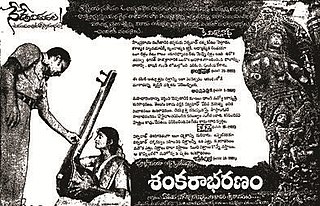
Sankarabharanam is a 1980 Indian Telugu-language musical drama film written and directed by K. Viswanath. Produced by Edida Nageswara Rao under the production company Poornodaya Movie Creations, Sankarabharanam starred J. V. Somayajulu, Manju Bhargavi, Chandra Mohan, and Rajyalakshmi. The soundtrack was composed by K. V. Mahadevan and remained a chartbuster. The film throws light on the chasm between Classical and Western Music based on the perspective of people from two different generations.
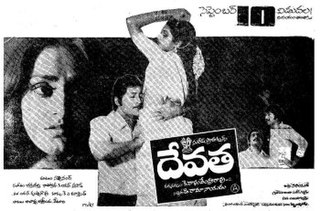
Devatha (transl. Goddess) is a 1982 Indian Telugu-language film directed by K. Raghavendra Rao, starring Sobhan Babu, Sridevi, Jaya Prada and Mohan Babu. The film was produced by D. Rama Naidu on Suresh Productions banner. The film is about two sisters and their love triangle with a man. K. Raghavendra Rao remade the film in Hindi as Tohfa (1984), with both Sridevi and Jaya Prada reprising their roles. It was also remade in Tamil as Deiva Piravi (1985) and also remade into Bengali Bangladesh as Obuj Hridoy (1989).
